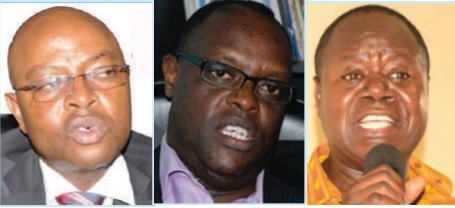
But Dr. Julius Kiiza, who teaches Political Economy of Development and Public Policy at Makerere University, disagrees with those who argue against massive investment in infrastructure is a misdirection.
He says a look at the developed countries, shows that massive investment in infrastructure always precedes any industrialisation push
The problem with infrastructure investment in Uganda, he says, is the corruption, over invoicing, embezzlement and all manner of wastage involved.
“When we raised these issues in the past, were were labeled bipingamizi (detractors),” he says, “But President Museveni also admitted the problem of wastage in his 2016 State of the Nation address.”
He says Museveni bloated government is also a drag on the economy and should be trimmed to match the tough economic times.
He says Museveni should not have the over 70 ministers and the multiplication of cost centres like districts should stop.
What the experts said:
Seasoned economist, Augustus Nuwagaba
He gives a more detailed explanation of how the structure of Uganda’s economy is at the heart of the crisis. The country’s GDP is estimated at US$25 billion. But, Nuwagaba asks, where does this GDP come from?
“It is from the service sector; largely telecommunications (44.3%), but ironically, the service sector employs a paltry less than 1% of the population,”
“The agricultural sector which employs 76% of the population ironically contributes only 23% of GDP.”
Nuwagaba adds: “This means that the sector which is clearly the most economically endowed and therefore capable of creating jobs and broad- based growth is surprisingly incapable of doing so. It is this contradiction that the country continue to enjoy growth but which leaves out the majority that remain with low incomes, hence low aggregate demand.
“One can argue that the UK or USA economy has agriculture contribution of less than 2% of the GDP. This is correct. But remember; the number of people engaged in the agriculture sector in these countries is actually also less than 1%! So, there is no contradiction.”
Dr. Julius Kiiza, who teaches Political Economy of Development and Public Policy at Makerere University
According to Kiiza, things would be different if the people in charge of the economy (Finance and BoU) were not parasitic elites.
He explains that while patriotic/nationalistic elites ensure that money meant for public works is spent on public works, mobilise state power and institutions to drive production, in Uganda you have parasitic elites who surrendered thinking to foreign interest.
“All they ask is what does the IMF say,” Kiiza said, “What does the World Bank say. They view the foreigner’s views as superior to those of nationals. They want a foreign consultant for this and that and in there is the problem.”
He has previously described these technocrats as faithful servants of international interests, specifically, the World Bank and IMF.
What you have, Kiiza says, is a deficient supply of captains of industry who can mobilise the state resources and use them to drive production and bring about transformative jobs.
To make his point, he cited the central focus of the central bank—maintaining macro-economic stability.
“While this is a good thing, it should not be an end within itself,” Kiiza said, “But You have the central bank whose cardinal role is pursue monetary and macro-economic stability, which he said is a conservative view by conservative actors. Beyond that, our elites should be asking; what results, jobs, and economic transformation do these policies deliver?”
For Kiiza, anyone who talks of Kisanja hakuna mchezo when we have not changed the actors and the ideology of such elites “is the greatest mchezo.
Stephen Kaboyo, the proprietor of Alpha Capital
For Kaboyo, 2016 has been challenging mainly because of external factors.
“The current slump is not unique to Uganda,” he says, “but most of the economies in sub- Saharan Africa are also going through similar challenges on account of low commodity prices, a slowdown of inflows from major trading partners, weak currencies, rising fiscal vulnerabilities just to mention a few.”
He adds that while there are short term challenges, medium prospects look promising.
“Growth is projected to bounce back primarily driven by the multi-billion dollar investments in power, railway, roads and oil related infrastructure,” he explains, “This will offset the effects of the weak external sector and put the economy on good footing in the coming year.”
Lastly, he says, he found the decision by the Central Bank to ease monetary policy an appropriate action aimed at boosting private sector growth and support economic activity.
****
editor@independent.co.ug
 The Independent Uganda: You get the Truth we Pay the Price
The Independent Uganda: You get the Truth we Pay the Price



